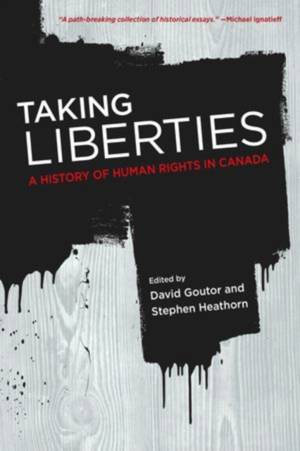
- Afhalen na 1 uur in een winkel met voorraad
- Gratis thuislevering in België vanaf € 30
- Ruim aanbod met 7 miljoen producten
- Afhalen na 1 uur in een winkel met voorraad
- Gratis thuislevering in België vanaf € 30
- Ruim aanbod met 7 miljoen producten
Zoeken
Taking Liberties
A History of Human Rights in Canada
David Goutor, Stephen Heathorn
Hardcover | Engels
€ 34,45
+ 68 punten
Omschrijving
Universal human rights are considered to be a fundamental, inalienable aspect of Canadian legal culture, not to mention central to our international positioning. However the reality is that Canada was surprisingly slow to adopt the rights revolution that followed the Second World War, given concerns that existing norms and liberties could conflict with these new universal rights. Moreover, even when Canada did sign up, these rights were not all automatically put into practice. Nor, interestingly, did all groups embrace these rights. Human rights, as we know, did become entrenched. There have been challenges to and changes in the legal framework of citizenship in Canada. But this has followed a long process of transformation, and many groups have faced tremendous struggle to get their rights claims recognized. This collection sheds new lights on the bumpy road toward universal human rights in our diverse and complex country. Topics include sexual rights, children's rights, "race" and multiculturalism, and class. A landmark essay by J.R. Miller explores the rights of Aboriginal peoples from the 1876 Indian Act to the repeal of Section 67 in the Canadian Human Rights Act in 2011. Also considered is the central role of rights activists-often struggling in the face of widespread hostility-to secure protection for their rights. A highly insightful, original foreword by Michael Ignatieff is based on a very well-received public lecture in response to the chapters written for this volume. New research in the growing new field of human rights history explores the novelty of, the struggle for, and the limitations of, the new rights regime, and its uneven application across Canadian society.
Specificaties
Betrokkenen
- Auteur(s):
- Uitgeverij:
Inhoud
- Aantal bladzijden:
- 304
- Taal:
- Engels
Eigenschappen
- Productcode (EAN):
- 9780199004799
- Verschijningsdatum:
- 28/11/2013
- Uitvoering:
- Hardcover
- Formaat:
- Genaaid
- Afmetingen:
- 147 mm x 229 mm
- Gewicht:
- 521 g

Alleen bij Standaard Boekhandel
+ 68 punten op je klantenkaart van Standaard Boekhandel
Beoordelingen
We publiceren alleen reviews die voldoen aan de voorwaarden voor reviews. Bekijk onze voorwaarden voor reviews.











